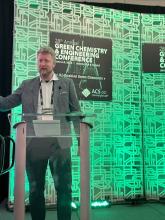Green Chemistry
The IC2 Ken Zarker Award
The Interstate Chemicals Clearinghouse invites submissions for our
Reimagining Sustainable Chemical Education
Chemists from around the world convened at the American Chemical Society headquarters in Washington, DC, and virtually on Dec. 7 and 8, 2023, for the second annual ACS Sustainability Summit: Reimagining Chemistry Education. The meeting was held as part of the ACS Campaign for a Sustainable Future, in partnership with the ACS Division of Education and Beyond Benign Green Chemistry Education.
Designing for a green chemistry future
The material basis of a sustainable society will depend on chemical products and processes that are designed following principles that make them conducive to life. Important inherent properties of molecules need to be considered from the earliest stage—the design stage—to address whether compounds and processes are depleting versus renewable, toxic versus benign, and persistent versus readily degradable.
A promise to a sustainable future: 10 years of the Green Chemistry Commitment at Beyond Benign
From the publisher's website: "Green chemistry education is a fundamental tool for the achievement of a sustainable future at the molecular level. It allows the development of a scientific workforce and knowledgeable citizenry with the skills to choose, assess, and further design more benign processes for human health and the environment. In 2007, Dr Amy Cannon and Dr John Warner co-founded a non-profit organization known as Beyond Benign to empower educators dedicated to creating a systemic, long-lasting, and meaningful change in education through green chemistry.
Green chemistry as just chemistry
Environmental injustices have exposed our current system of reliance on polluting and toxic chemicals and chemistries as untenable and one whose risks and burdens are disproportionately borne by those who are disadvantaged.
Student Funding for ACS Denver - GSSPC Symposium
The ACS Fall 2024 Graduate Student Symposium Planning Committee (GSSPC) is eager to facilitate student participation at the ACS Fall 2024 National Meeting through the provision of travel grants. Our symposium, titled "Breaking the Mold: Building Communication to Promote Green and Sustainable Practices," will spotlight cutting-edge approaches and strategies in promoting eco-friendly and sustainable methods, presented by a varied panel of esteemed speakers. All travel grant recipients are mandated to attend this full-day symposium during their presence at the national meeting.
Toward Property-Based Regulation
An expanding web of adverse impacts on people and the environment has been steadily linked to anthropogenic chemicals and their proliferation. Central to this web are the regulatory structures intended to protect human and environmental health through the control of new molecules. Through chronically insufficient and inefficient action, the current chemical-by-chemical regulatory approach, which considers regulation at the level of chemical identity, has enabled many adverse impacts to develop and persist.
Pagination
- Previous page
- Page 16
